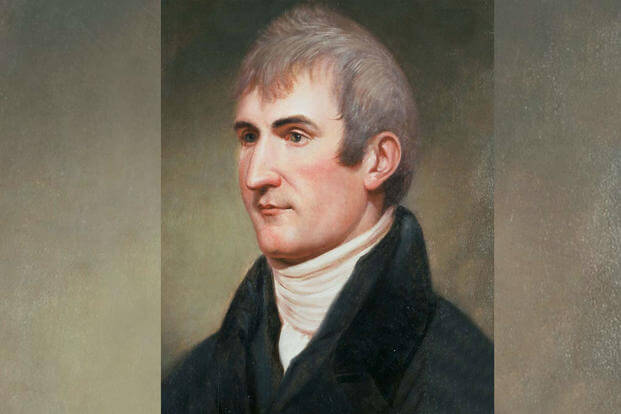Many people recognize the significance of the names "Lewis and Clark," but fewer know that Army Capt. Meriwether Lewis' westward expedition was wholly a military endeavor. As official commander of the Corps of Discovery, Lewis, who has been termed "the greatest pathfinder this country has ever known," not only charted new territory; he also carved out a nation's destiny.
Born into the Virginia gentry on Aug. 18, 1774, Lewis received a grounding in the fundamentals of rhetoric and arithmetic supplemented by training as a gentleman farmer and a deep interest in the natural world. His stepfather, John Marks, was an Army officer whose example may have encouraged young Lewis to join the Virginia Militia during the Whiskey Rebellion in 1794. He transferred to the Army in 1795 and served during the Indian Wars, where he was briefly assigned to Capt. William Clark's company.
By 1801, Lewis had risen to the rank of captain and was selected by President Thomas Jefferson to be his private secretary. Jefferson designed a course of study for Lewis that included the tutelage of University of Pennsylvania professors in preparation for an expedition that would take him into the unexplored territory west of the United States. Lewis had first proposed such a venture in 1792, but now his training and knowledge had caught up with his wanderlust. With up-to-date knowledge of his route, and carte blanche to form the Corps of Discovery, Lewis asked his old comrade, Clark, to accompany him. The two men privately agreed to lead together, though Clark was given the title of lieutenant.
Just before the expedition set out, Jefferson and Napoleon negotiated the Louisiana Purchase. Rather than scouting out foreign territory, the party would be exploring American land. From May 1804 to September 1806, the 30-member Corps of Discovery made its way to the Pacific Ocean -- which they first glimpsed on Nov. 7, 1805 -- and back, navigating four different rivers and crossing the Continental Divide en route.
All this was undertaken to discover "the most direct and practicable water communications across this continent for the purposes of commerce," per Jefferson's instructions. However, it was to the young nation's benefit that Lewis, with his knowledge of biology and geography, and Clark, schooled in astronomy and cartography, did not limit their meticulous records to the direct and practicable. Instead, they provided a painstaking record of a world of flora, fauna and indigenous peoples that would never be the same again.
On the Corps' return in 1806, Jefferson made Lewis governor of the Louisiana Territory. Lewis proved himself a poor administrator and struggled to complete an edition of his valuable journals. (They were finally published, in abridged form, by Nicholas Biddle in 1814.) In 1809, traveling to Washington to make an official report, he died under ambiguous circumstances at a Tennessee tavern. Historians still debate whether the 35-year-old Lewis was murdered or died of suicide.
Want to Know More About the Military?
Be sure to get the latest news about the U.S. military, as well as critical info about how to join and all the benefits of service. Subscribe to Military.com and receive customized updates delivered straight to your inbox.















